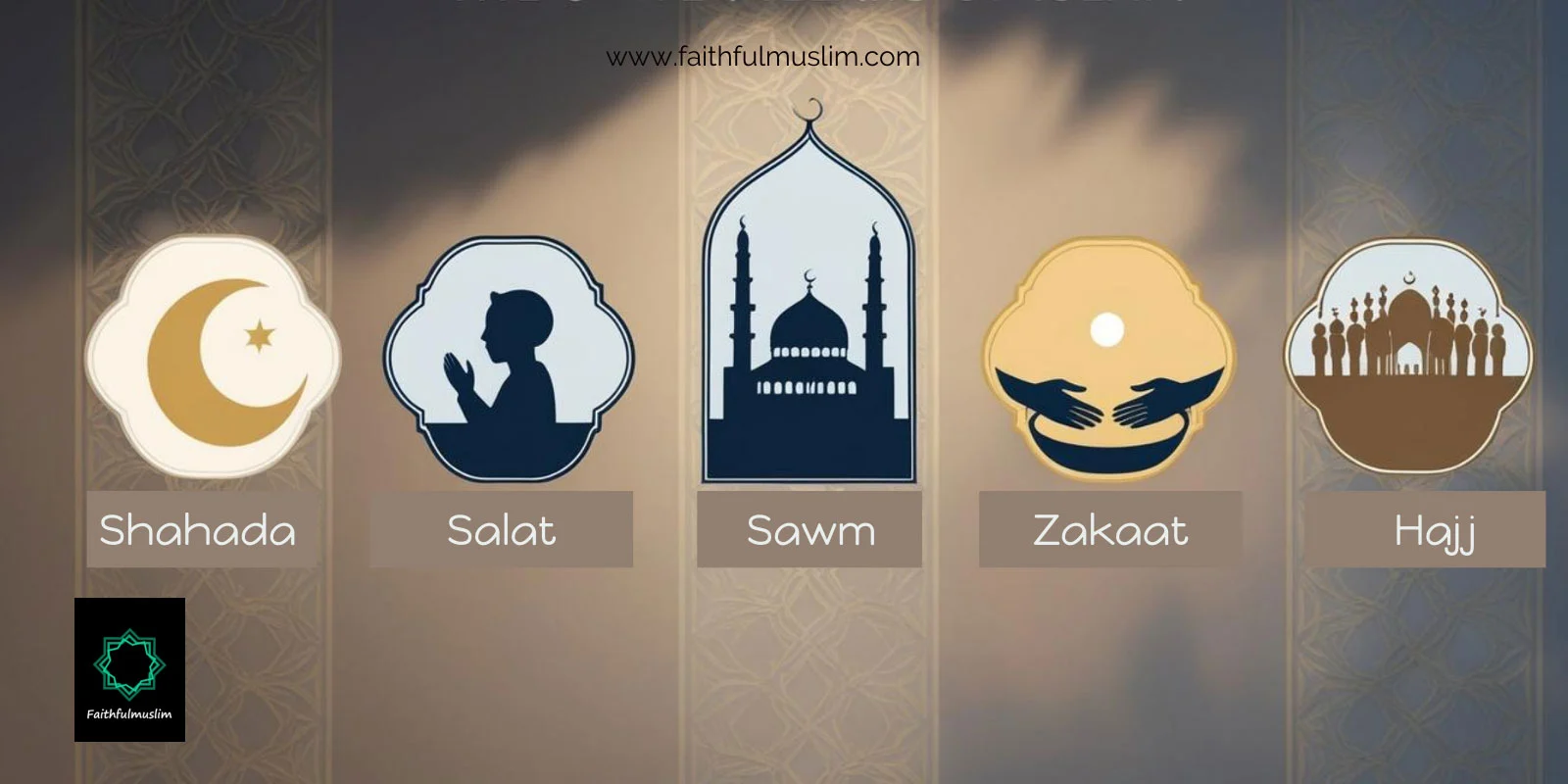What Do the Five Pillars of Islam Mean?
The true meaning of the 5 pillars of Islam is that they're the primary duties of Muslims. Think of them as the foundation of Muslims' lives. These pillars guide their actions and shape their beliefs. Each pillar strengthens the bond between them and Allah. These Islamic five pillars represent faith, prayer, charity, fasting, and pilgrimage. Muslims follow them to live in a way that pleases Allah.
Like rules in a game, these pillars keep people on the right path. They are called “pillars” because they hold up a Muslim’s faith. Practicing them brings Muslims closer to their Creator. It also builds a stronger sense of community and belonging.
In short, these pillars guide Muslims in their day to day activities. They show how to live with faith, discipline, and devotion to Allah. These core practices help Muslims stay connected to Allah and become more compassionate.
Origin of the Pillars
The five pillars of Islam religion were revealed to Prophet Muhammad (PBUH) by the angel Jibril (Gabriel). These teachings are in the Quran. And the teachings from the life of Prophet Muhammad (PBUH) are recorded as Hadith.
Though the five pillars of Muslim faith originate from the Quran, they are not listed in one place but are found throughout the Holy book. Also, they are not explicitly detailed there. Their full definition and explanation are found in the different Hadith literature.
Muslims have followed these pillars since the early days of Islam. They form the basis of Islamic laws, guiding the daily lives of every Muslim. They have remained unchanged for centuries.
Why Are the Pillars of Islam Important?
The pillars of Islam are important because they not only shape a Muslim’s life but also teach them morals. They bring discipline, kindness, and devotion. Each pillar connects Muslims to Allah and teaches valuable lessons.
-
Among the five pillars of Muslim faith, the first pillar, Shahada, reminds Muslims of their faith. It helps remember the oneness of God. Saying Shahada daily strengthens your belief.
When someone wants to become a Muslim, they recite Shahada. It's the first step towards becoming a Muslim. It’s like a promise to follow Islam. Saying it sincerely connects a person to the Islamic faith. The Shahada reminds Muslims of their belief in one God and the Prophet Muhammad.
-
Salat is the second among the five pillars of Islam religion. Salat, or prayer, creates a routine of worship and structure in life. Salat helps Muslims to get closer to Allah.
Muslims must pray 5 times daily - at dawn, midday, afternoon, sunset, and night facing Mecca. Fridays hold special significance, as communal prayers known as Salatul-Jumu'ah take place in mosques.
Prayers help Muslims stay connected to Allah. Salat also brings discipline and spiritual focus. Salat reminds people to be thankful and mindful of God’s blessings.
Also offering Salat helps improve flexibility and promotes a balanced body, supporting overall health and well-being.
-
Zakat teaches generosity. Sharing wealth helps reduce poverty and spreads kindness. It ensures that the rich and poor are cared for equally.
Zakat purifies wealth and makes it grow. It teaches kindness and reduces poverty. It reminds Muslims to care for the less fortunate and to be thankful for what they have. Unlike regular charity, it’s a duty or obligation for those who can afford it. Giving Zakat brings blessings from Allah and helps the giver feel grateful.
-
Sawm, fasting during Ramadan, builds self-discipline. Muslims learn patience and feel empathy for those in need. It helps Muslims focus on their faith.
The month of Ramadan ends with Eid al-Fitr, a joyous celebration marking the end of fasting. Eid al-Fitr is the most important celebration for the Muslims.
-
Hajj, the pilgrimage, creates unity. Every Muslim should undertake it at least once in their lifetime if they are physically & mentally fit and can afford the expenses. It happens in the twelfth month of the Islamic calendar, Dhu al-Hijjah.
During Hajj, Muslims wear simple white clothes called Ihram to show equality. Pilgrims visit the Kaaba and walk around it. They also perform other rituals.
Hajj reminds Muslims that everyone is equal in front of Allah.
The meaning of the 5 pillars of Islam is simple but powerful. Practicing them leads to a peaceful and balanced life. These pillars are not just rules but ways to show love for Allah and humanity. The five pillars of the Islamic faith guide every Muslim to live with purpose and good values. They are at the heart of the Islamic religion.
Conclusion
The five pillars of the Islamic faith show how simple actions can lead to a peaceful life. They teach faith, kindness, and gratitude, which are important values for everyone. Learning about the five pillars of the Muslim faith helps us respect and understand each other better.

